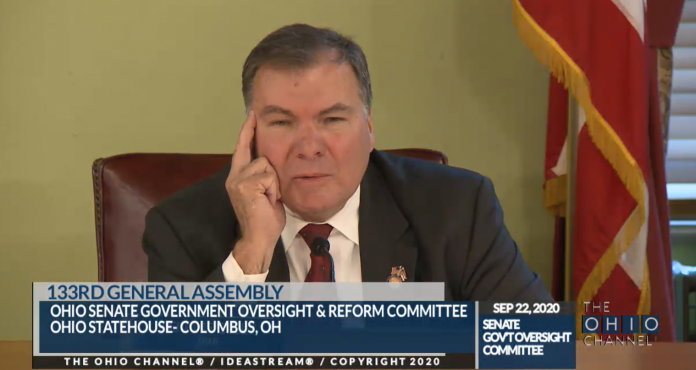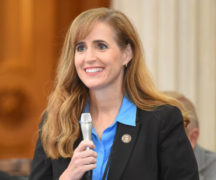By Susan Tebben
A bill sponsored by Ohio Senate President Larry Obhof to bar public officials from closing down licensed firearm dealers passed through committee on Tuesday, but not without questions on the priorities of the legislature.
The bill, which bans elected officials from closing down federally-licensed firearm dealers as part of an emergency such as a health crisis, passed the Government Oversight & Reform Committee along party lines. However, the head of a statewide pro-gun group spoke up to say the bill was a “solution in search of a future problem.”
“We have a current problem in Ohio, where we have gang-bangers and thugs and criminals and burners and looters and shooters and all kinds of criminals who are willing to throw off the bounds of law at the drop of a hat, and as a result endanger law-abiding gun-owners and peaceful citizens all across this state,” said Chris Dorr, head of Ohio Gun Owners.
Dorr frequently testifies in support of pro-gun measures in the Ohio legislature, but most recently has been outspoken on the stand-your-ground bill that is still being considered in the state Senate.
That law should be the priority, instead of proactively passing laws on future problems, he said.
Committee chairman, state Sen. Bill Coley, R-Liberty Township, took issue with Dorr’s representation of legislator’s priorities as Dorr said he would approve the measure as an amendment to the stand-your-ground bill.
“You come off and you start making comments about the intention of legislators who are introducing this bill, when those same legislators saw election polling places shut down, they saw other businesses shut down and they didn’t believe that was correct,” Coley said on Tuesday. “And instead, they want to make sure they are proactive so that in a future emergency, everybody’s rights and obligations are clear under…the Ohio Revised Code relative to federally licensed firearms dealers.”
Dorr rebutted, saying stand-your ground law “would send a big fat message to the criminal class that this caucus or this chamber stands for law and order.”
Also during Tuesday’s committee hearing, the body passed a Senate Concurrent Resolution opposing defunding police, and tabled multiple amendments made by the ranking Democratic member.
State Sen. Hearcel Craig, D-Columbus, brought up two amendments which were both tabled along party lines. One amendment urged increased implicit bias training within law enforcement, and another sought to restore local government funds, which support police departments and fire departments among other things, to 2011 levels, before the 2012 and 2013 budget slashed the fund by half.
“By restoring the LGF, we are uplifting our local communities and allowing them to have budgets that reflect the needs of each individual community,” Craig told the committee.
The amendment was tabled without further discussion, with the exception of Chair Coley commenting on casino revenues from which local governments benefit.
“I do note that the local governments never complain about the $100 million a year that we give away in free promotional play,” Coley said.
The sponsor of the bill, state Sen. Theresa Gavarone, R-Bowling Green, has said diverting funds from law enforcement “even one dollar is too much.”
***
Ohio is now closing in on 2 million absentee ballot requests
More Ohioans are embracing absentee voting this year than ever before, figures provided by Ohio Secretary of State Frank LaRose show.
A total of 1,784,004 absentee ballot applications had been received by the 88 county boards of elections offices as of Sept. 18, LaRose announced. That includes nearly 400,000 in just the week leading up to that date, meaning Ohio is well on pace to surpass 2 million absentee ballots requested.
The 1.78 million ballot applications received thus far in 2020 is already more than twice as many as received at the same point in 2016, according to LaRose. READ MORE
Cleveland now ranks as the poorest big city in the United States
Cleveland had the highest poverty rate among large U.S. cities in 2019, overtaking Detroit, according to data released by the U.S. Census bureau last week. The data for the ranking is from 2019, before the coronavirus pandemic exacerbated problems related to poverty in Ohio and around the country.
The Cleveland-based Center for Community Solutions reported in a post Monday that although Cleveland’s overall poverty rate fell from 33.1% to 30.8% from 2018 to 2019, Detroit’s rate fell faster and is now just barely below Cleveland’s at 30.6%.
“These estimates are close enough to be within the margin of error — but no matter the rankings, it is clear that Cleveland is a high-poverty city,” the Community Solutions center noted in the post.
In 2019, more than 114,000 people lived in poverty in Cleveland, including 37,700 children and nearly 12,000 older adults, the statistics show. READ MORE
Consumer advocate again demanding independent probe of FirstEnergy
Ohio’s official consumer advocate is again asking that regulators mount an independent investigation into whether a Northern Ohio utility improperly used ratepayer funds to fuel what federal prosecutors called the biggest bribery scandal in state history.
The Office of Ohio Consumer Counsel on Monday objected to a directive last week by the Public Utility Commission’s attorney examiner — an administrative law judge — that Akron-based FirstEnergy itself show that it didn’t use ratepayer funds to pay for a scheme to pass a nuclear bailout last year.
U.S. Attorney David M. DeVillers in July charged then-House Speaker Larry Householder, R-Glenford, and four associates in what DeVillers called a $60 million bribery scheme. It was intended to make Householder speaker and pass House Bill 6 — a $1.3 billion ratepayer-financed bailout, which will mostly be used to prop up two failing nuclear power plants owned by Energy Harbor, a FirstEnergy spinoff, DeVillers said.
The U.S. attorney said that much of the money passed from “Company A” (FirstEnergy) and its affiliates to 501(c)(4) “dark money” groups. It was then used for four purposes: to elect members to the House who would vote to make Householder speaker; to pass HB 6; to fight off a ballot initiative to repeal HB6, and to line the pockets of Householder and his associates, DeVillers said. READ MORE





